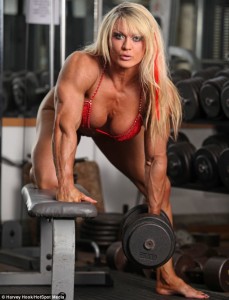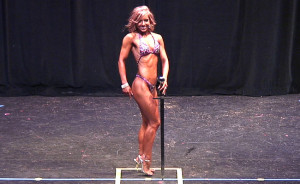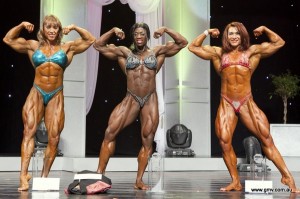The word bodybuilding brings to mind images of muscle-bound, spray-tanned men flexing and posing on stage after weeks and months of grueling exercise and strict dieting.
Stone-lifting competitions in Ancient Greece eventually led to Eugen Sandow’s large-scale competitions and regimented exercise programs popularized by Charles Atlas in the early 20th century.
Mainstream popularity exploded when the film “Pumping Iron” hit screens in 1977, igniting the careers of people like Arnold Schwarzenegger and Lou Ferigno, popularizing what was before then considered a niche culture.
But the impact wasn’t just felt by men.
Female competitions were established and more and more women began to take part. In 1982 the International Federation of BodyBuilding and Fitness (IFBB) officially recognized the women’s sport.
And while facing serious issues of inequality, steroid use and popular misconceptions, the sport is growing as it evolves in the face of cultural changes.
Tracey Greenwood, an associate professor of exercise physiology at Eastern University in Philadelphia, has competed in numerous fitness, figure and bikini competitions, and is a nine-time IFBB Fitness Champion. She also is a recognized trainer and nutritionist for a number of competitive bodybuilders – both male and female – and has sponsored contests throughout the region.
 “The word bodybuilders is really not appropriate,” Greenwood states. “Everybody’s bodybuilding. But people who know the sport know that bodybuilders are one look a woman can attain and compete in bodybuilding, which is a much more muscular physique. But then there’s fitness and figure and bikini, and those are degrees of less muscularity with maybe a little bit more shape, smaller size. But to the layperson walking down the street, all women that compete in this are considered a bodybuilder. And I think there is a great negative stigma attached to that term.”
“The word bodybuilders is really not appropriate,” Greenwood states. “Everybody’s bodybuilding. But people who know the sport know that bodybuilders are one look a woman can attain and compete in bodybuilding, which is a much more muscular physique. But then there’s fitness and figure and bikini, and those are degrees of less muscularity with maybe a little bit more shape, smaller size. But to the layperson walking down the street, all women that compete in this are considered a bodybuilder. And I think there is a great negative stigma attached to that term.”
Dedicating oneself to the sport is hard enough without the attachment of preconceived gender roles that pervade society and the sport itself.
Greenwood says unsolicited ideals of feminine aesthetics are routine topics of conversations initiated by family, friends and complete strangers. And the dedication to necessary regiments can lead to alienation from and relationship changes.
“You eat, sleep, train,” Greenwood said of the arduous process of preparing for a competition. “That’s pretty much all you do seven days a week. It’s 100% diet, 100% training, 100% rest, is what it takes to get to the top.”
Stephanie Shaver, who competed in her second bikini competition at last Saturday’s National Physique Committee Delaware State Championships and Delmarva Classic at Delaware Theater Company in Wilmington, encounters both the good and bad scenarios.
Originally from New York, where she returned for the first time since committing to the sport, was greeted with mixed feelings when loved one’s noticed her transformation.
“Somebody stopped me and was like ‘What are you doing?’” she said of one run in with an old friend. “She asked me about it, told me I looked a lot different and complimented me on it. But then I’ll get the people that would say [like] one of my mother’s friends ‘Well, make sure she doesn’t get into those steroids. Make sure she doesn’t get too into it,’ because it can consume you. But right now I think I’m in a healthy spot and I love what I’m doing.”
The performance enhancers are certainly an issue and for women the use of steroids derived from the naturally occurring male hormone testosterone present a different risk. Some women erroneously use higher dosages of the drugs expecting more muscle growth, despite scientific proof that runs counter to this theory. The effects of high dosage use could result in drastic changes to sexual characteristics, disruption of the menstrual cycle, acne, aggression, and increased hair growth.
A 2000 McLean Hospital survey found that one-third of the female bodybuilders reported past or current steroid use. And half of non- users admitted use of other PED’s like ephedrine.
Within the bodybulding community, however, attempts to curb the use of steroids have resulted in judges placing an emphasis on recognition of female aesthetics when determining winners. And whether or not this is the right way to go, in lieu of proper testing at local competitions, it seems to be the only feasible solution.
Greenwood says she’s received her fair share of steroid allegations.
“I was accused of taking so much stuff when I was competing as a pro,” she said. “I think everybody in the sport is prepared for that and somebody who has really good self-esteem if somebody accuses them of that they might just say ‘Hey, you know what? That’s not the case, but thanks for the compliment.”
 But drugs are the least of the concerns for some fitness competitors. In a sport where on is being judged on their external qualities only, that can be stressful to anyone, let alone those dealing with issues of body image.
But drugs are the least of the concerns for some fitness competitors. In a sport where on is being judged on their external qualities only, that can be stressful to anyone, let alone those dealing with issues of body image.
And while it’s widely accepted that a person’s perception of their own appearance can be vastly different from how others perceive them, the issues faced by female fitness athletes concerning their body image don’t skew any differently than the public at large.
Greenwood says that despite the seeming superficiality of the concept, competitors must develop a positive perspective on having their bodies scrutinized.
“You have to have very thick skin to do this sport because you’re going to get feedback on your body and sometimes it’s not what you want to hear. You can’t take it personal. It’s business. You just have to make the changes the judges want.”
Greenwood adds that some women have a harder time getting to the top than others, and some have to “suffer” through their training more than others.
“Every woman’s body is different. Everybody can train on a different level. But they all are trying to attain the same look to be competitive. You can only control the package you bring to the stage that day.”
Its with these risks and others that Greenwood advises never jumping into the sport without understanding what is expected. She says first and foremost, anyone interested in bodybuilding must attend an event.
Once they have an idea what the competitions entail, the next step is to find someone who knows what they’re doing to train you.
“Get a coach,” she insists. “Get somebody who’s done this for a long time that knows how to work with women or men, whatever you’re going to compete in. It’s always better to have another pair of eyes. Because when you look at yourself a lot of people see flaws and you don’t alwys see what needs to be seen. So its always good to have somebody else to look at you and help you make changes.”
Courtesy of: Delaware Public Media
